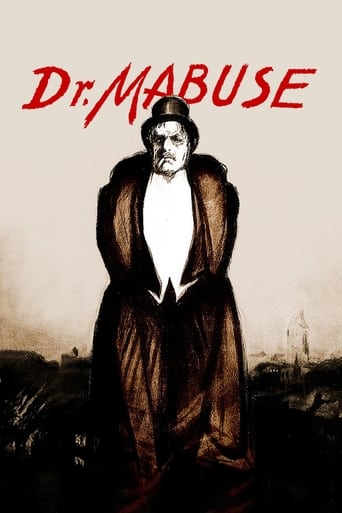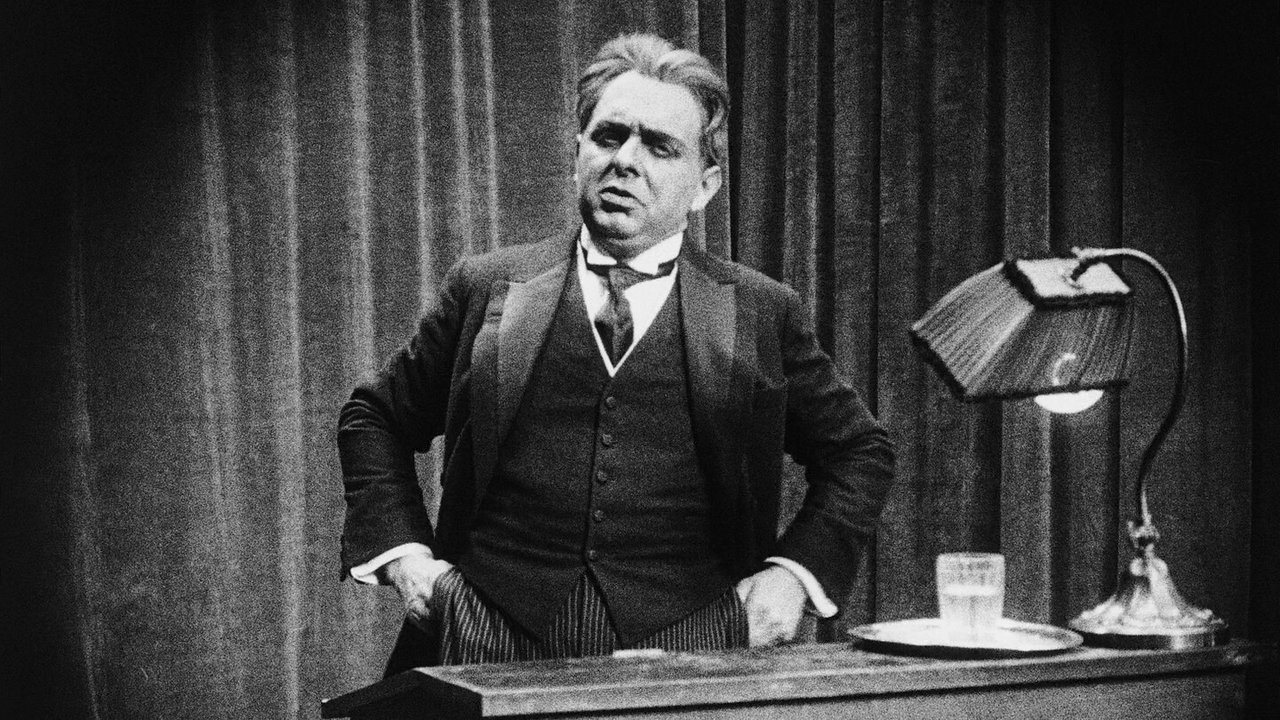Jamie Ward
Following their ruinous defeat during the War, Germany found itself in what is now commonly referred to as the Weimar era. It's a uniquely fascinating point in the country's history dominated by a stark contrast between impoverished casualties of war and lavishly wealthy benefactors soaking in aloof decadence. This divide between societal poles was not exactly one unlikely to be crossed by any daring enough to grab a boat and travel the uncertain waters however, and director Fritz Lang frequently visits this idea throughout his first major feature film still highly regarded to this day. Bouncing back and forth between seedy gangsters, the hoity-toity elite and those unfortunate enough to be tasked with keeping everything in order (the law), Lang embellishes his film with a unique and varied palette of both character and tone for its time. Based on the novel Dr. Mabuse, der Spieler by Norbert Jacques, the story follows psychoanalyst-by-day, underground-criminal-mastermind- by-night Dr. Mabuse as he manipulates his way up the rungs of society seemingly with ease through various nefarious means including stock market manipulation and psychological mind-control during card games at high-profile gambling joints. The central theme here warns of granting overwhelming dominance through terror and misdirection at the hands of a charismatic megalomaniac misleading an already misled and fractured society; a warning that evidently fell on deaf ears before the eventual rise of the national socialists a little more than decade later, at which point Lang promptly packed his bags and headed for the States. While at its heart The Gambler may simply be something of a proto-noir gangster movie with light fantasy elements, lurking somewhere in the foreboding shadows that dominate most the film's sets is a thinly-veiled socio-political commentary that can—for the most part—be a fascinating and engrossing thriller all at the same time.Mabuse is played by Rudolf Klein-Rogge, best known these days as Rotwang the Inventor from Lang's most famous film Metropolis released five years following The Gambler. While his performance in the science-fiction epic is limited but nevertheless memorable, it's a true delight to see him take center stage here as he delivers an iconic performance of the mad-but-brilliant Dr. Mabuse. As one of the character's central traits is psychological manipulation which he delivers through various fictional guises to further distract his victims, Klein-Rogge is given plenty of room to jump between personas which vary between the bizarre and ruthlessly callous, all of which he excels in bringing to life vividly. Supporting actors and actresses back up the leading man well, specifically Alfred Abel (also of limited Metropolis fame) and Gertrude Welcker who together play a husband and wife soon at the mercy of Mabuse's twisted puppeteer hands. Bernhard Goetzke is fine as State prosecutor Norbert von Wenk, but his character sticks too closely to convention to make him stand out as anything more than a pawn serving as the plot's catalyst to chug along with its rich character drama.Those who have seen Metropolis and are less familiar with Lang's earlier works may be surprised or disappointed by the director's more restrained approach to expressionist sets and effects here in The Gambler. While his contemporaries at the time, Murnau (Nosferatu) and Wiene (Caligari), had fervently adopted the popular art movement in their respective films from the early 20s, Lang was still something of a critic and instead opted to lightly season Mabuse, rather than to glaze it every 15 minutes. Nevertheless, much of the film's most memorable and compelling moments arise from these experiments in expressionism that often mirror the film's otherwise dark and brooding atmosphere with surreal imagery that conveys the characters' inner madness, isolation, torment and despair. It's no wonder then that Lang would go on to make Die Nibelungen and Metropolis, each one more expressionist and surreal than the last.So having said all that, it must also be noted that The Gambler is somewhere near 270 minutes long. What I've highlighted above are areas where around two-thirds of that runtime fully take advantage of what Mabuse has to offer. The other third is more problematic and occurs mostly during its middle section where the cat-and-mouse game between Mabuse and Norbert von Wenk goes around in circles. Though there are highlights here and there, a long stretch of 90 or so minutes occurs that feels like it could have been chopped down to 30 without much consequence other than to make the pace of the film easier to digest. And yes, I know the movie is in fact a two-part deal, but the fact that this means the first movie's ending is lacklustre and the second movie's opening lacks the enthralling immediacy of its predecessor doesn't change anything and still hurts an otherwise well-paced film.Dr. Mabuse's first outing on the big screen is for the most part a rewarding and compelling experience, but nevertheless presents the viewer with a challenging middle half that tugs along lethargically rather than with the brisk pace that bookends the feature. However frustrating this section can be however, The Gambler remains as a feature that does a lot well and very little poorly. And thanks to a wonderfully memorable performance by Klein-Rogge backed up by an equally haunting atmosphere, rich cast of diverse characters and otherwise thrilling plot, Fritz Lang's 1922 testament to Germany's Weimar era is a captivating classic, not without its flaws, but also not one to be overlooked either.
ofpsmith
Dr. Mabuse: The Gambler is a 4 hour long film, making this the longest film I've ever seen as of this writing. Dr. Mabuse (Rudolf Klein-Rogge) and his gang are planning to pull a huge heist in money using Mabuse's telepathic abilities. But Mabuse is up against state attorney Norbert Von Wenk (Bernhard Goetzke) who is investigating the strange happenings in Berlin. The story comes in two parts and it's a long one. Klein-Rogge does a great job as Mabuse who would later reprise his role in the next film, The Testament of Dr. Mabuse. Mabuse's telepathic abilities as well as his abilities to take away someone else's will create a terrifying villain. This film is great. It's a long movie but if you find some extra time on your hands give it a watch.
hasosch
Dr. Mabuse is based on a real figure whom its literary Immortalizer, Norbert Jacques, met on a voyage across the Lake of Constance. Since this and other facts are not mentioned on the 2nd disc of the Murnau-restoration edition of Fritz Lang's "Dr. Mabuse, Der Spieler" (1922/2001), I will mentioned them here. For Lang himself, Dr. Mabuse was Nietzsche's "Übermensch", the human thus, as one can read in one of the first chapters of "Zarathustra", a "transition and a downfall between animal and Übermensch". As such, he has the power to control humankind. All those people who are surprised to see in Lang's film that Dr. Mabuse on the one side cheats 150'000 Dollars from a single individual (by the way without cashing the sum), but on the other side is capable of manipulating the world's stock market, should be fully aware of its position in "philosophical genetics".However, I do not agree that Dr. Mabuse is solely Nietzsche's Übermensch - as we see in the three Mabuse-movies of Lang and in the 6 that were directed by Dr. Harald Riedl and others in the 60ies -, there are actually two different Mabuses: While it is controversial if the first Mabuse, Lang's Mabuse, can justly be seen as a prototype for Hitler, the second Mabuse, Riedls Mabuse, is it for sure - the Nazi-time had just passed, and it is easier to show a prototype afterward than before. Nevertheless, the first Mabuse seems to be less a prototype than a patchwork of a lot of literary figures that have been characteristic for the beginning of the 20th century in Germany: Dr. Mabuse is also Peachum out of Brecht's "Dreigroschenoper" (filmed by G.W. Pabst, 1931), he has a lot in common with the gangster boss played by Gustav Gründgens in Lang's "M - Eine Stadt Sucht Ihren Mörder" (1930), he is very close to Pums, the gangster boss in Döblin's "Berlin Alexanderplatz" (played by Ivan Desny in R.W. Fassbinder's mini-series from 1980). As such, Dr. Mabuse is the contradictory opposite figure of Franz Biberkopf (out of the same fore-mentioned novel and film). In top of all, Dr. Mabuse has nothing in common with Hitler besides being able to manipulate masses. But here one should not forget that Dr. Mabuse is a psychiatrist (clearly shown in Lang's movie, part I). However, Dr. Mabuse is solely interested in might for himself, and unlike Hitler, he does not care if his opponents are Jewish, "Arian" or whatever. He also does not need the masses to fulfill his plans, since he works alone, slightly supported by his imbecile helpers. Moreover, Dr. Mabuse, the scientist, does not write books and programs for the masses with the purpose of cleaning out the state from foreign elements - such Paralipomena do not interest him; why should they.
J. Spurlin
Dr. Mabuse is a name familiar to almost everyone in Germany, but most Americans would have to be told that he's a criminal mastermind, psychiatrist, gambler and hypnotist with supernatural powers. Mabuse is notable for his brilliant disguises and his gang of minions who conspire against people and institutions for the sole purpose of bringing power and wealth to himself. This evil genius is known only as The Great Unknown to those who wish to stop him. Mabuse was created by Norbert Jacques for a novel which has never been out of print in Germany. The director of this film, Fritz Lang, claimed him for his own; and now Mabuse is known not as a character in a novel but as a character in three Fritz Lang films, the first of which is this innovative and hugely influential silent movie.Lang's storytelling techniques are especially innovative, but later spy films, including Lang's own, have greatly improved on what's here and leave modern viewers alert to the slow pace, murky details and confusing plot twists. What hasn't been improved upon is the artistry behind the photographic effects. I don't mean the effects themselves: modern special effects are infinitely more sophisticated. This film's effects have a great impact even—or especially—on today's viewer who is accustomed to a rapid-fire series of elaborate, gaudy computer-generated pictures, like those in, say, Peter Jackson's "King Kong." Nothing in that film is as memorable to me as this movie's scene where the camera closes in on Mabuse and everything around him goes dark, leaving only one glowing, malevolent head floating in the blackness.The highly exaggerated style of acting from everyone in the cast would look idiotic if seen in isolated bits. Von Welk (Bernhard Goetzke), tilting back his head and crossing his eyes as Mabuse (Rudolf Klein-Rogge) hypnotizes him, would have been a perfect clip for Jay Ward's "Fractured Flickers." As part of this film, every melodramatic moment from the cast is effective in a way that a more naturalistic style can never be.Fans of the Mabuse films, which number many more than just Lang's three, are sometimes disappointed by this first incarnation. This Mabuse allows himself violent emotional outbursts, while the later version is marked by icy self-control. The more familiar Mabuse may be an improvement over this one, but they don't quite replace him, and those films don't quite replace this one. This is a treasure for film historians, and indirectly a treasure for fans of the countless movies influenced by it.For those who simply want a good movie, there's plenty here to reward them, provided they are very, very patient.


 AD
AD




